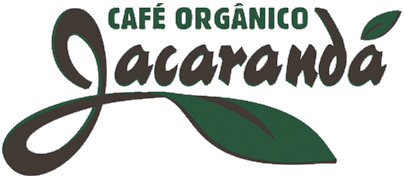
| 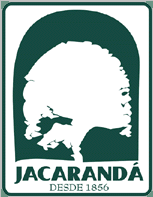 |
|
We met the Franco family on a hastily arranged visit to Fazenda Jacaranda when we were in Brazil for the World Social Forum. It was February, during the rainy season. The steady downpour prevented us from filming, but when we complained, Ruben said, "The more it rains, the better for the coffee. We will have a good crop this year."
Down the hillside are coffee plants growing amongst the trees, the ground covered by native grasses. Around a bend and all we can see are banana trees. "Are you raising bananas, too?" we ask. "No," says Ruben, "just coffee. This is 'agro-forestry'. It is one more way to increase the bio-diversity on our farm. We raise high quality coffee, and we are proud of it. But ultimately we measure our success by our biodiversity." Pointing across the valley to a neighbor's fields, he says, "Look at those coffee bushes, out in the open with no trees around them. You can get a higher yield that way, but you have to use a lot of chemicals. That kills beneficial insects in the soil and drives away the birds. See how the ground between those coffee bushes is brown. They spray it with Roundup, so nothing grows in it. Look between our coffee plants, the grasses and weeds are thriving. And listen to the birds."
Several years ago Vietnam, whose forests were devastated by bombs and defoliants during years of war, utilized financing from the World Bank to go into the coffee business. They planted vast areas with café robusta,. grown with lots of chemicals and in full sun, destined for the canned coffee market around the world. But 4 years later when the plants began to produce, the Vietnamese coffee flooded the market, and international coffee brokers drove down the price of coffee worldwide. Hundreds of small producers were driven out of business, and thousands of coffee workers lost their homes and jobs.
But when prices in the international market go down, coffee farmers are under pressure to reduce costs in order to compete, and often those reductions come at the price of the environment and workers' wages. To continue and increase the proportion of coffee production that is environmentally and socially sustainable means expanding the market while keeping prices high enough so ecological producers can stay in business. The public needs to understand that it costs more to grow things right, but the cost is well worth it. We are producing JAVA JIVE to applaud growers like Fazenda Jacaranda, who use no chemicals, maintain and increase forest cover, and pay their workers a living wage. We will contrast these with other growers, who wipe out forests, depend upon on herbicides and pesticides, and exploit a dependent workforce that lives in primitive conditions. Some of these growers would improve their labor and environmental practices if they felt confident they could sell their crops for a high enough price to remain viable. If the public demands sustainably grown coffee, and is willing to pay for it, this will happen. hair bundles uk We plan to return to Fazenda Jacaranda in August or September, at the height of the harvest. Carlos and Ruben will show us around as before, but it won't be raining. And we will be able to film scores of coffee workers hand picking selected beans, and spreading them out to dry. We will also visit more conventional plantations in Brazil, where coffee is grown in full sun with chemicals. We'll ask those growers to explain why they grow coffee as they do. We have already filmed extensively at a shade grown, certified organic coffee cooperative in Nicaragua, which also has a solidarity market arrangement, this time with the United States as part of the Bainbridge-Ometepe Sister Island Association. Our half hour program about that project, ISLAS HERMANAS, received rave reviews when it was broadcast on KCTS, the Seattle PBS station two years ago. Through these and other examples, JAVA JIVE will show how producers and consumers can work together to improve the ecology and standard of living in coffee producing areas. For more information, complete funding proposal and budget : Moving Images Video Project * 2408 East Valley Street * Seattle, Washington 98112 206/323-9461 * info@movingimages.org
Click here to see: www.terraverdi.com.br |
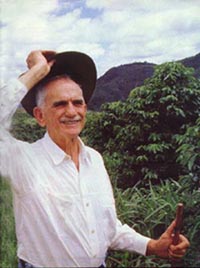 It is early in the morning, and Carlos Franco is sprinkling freshly ground corn on the railing of his veranda. It's for the birds," he says. Most of them like insects and fruit, but those little yellow ones love corn, and I love their song."
It is early in the morning, and Carlos Franco is sprinkling freshly ground corn on the railing of his veranda. It's for the birds," he says. Most of them like insects and fruit, but those little yellow ones love corn, and I love their song."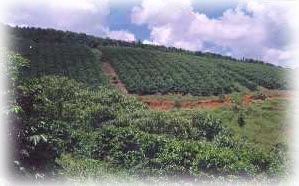 Wearing heavy rain gear, broad hats, and boots, we were shown around the farm. First Carlos pointed out several tall pine trees near his house. "We need to cut those," he says to Ruben, "and we can save the wood to build with. These are pine trees from North America," he explains to us. "In Brazil they grow very fast, providing shelter for native vegetation under their canopy. But now the native plants are big enough to make it on their own, so we will cut these pines. We want nothing that is not native to this part of Brazil, except, of course, for the coffee."
Wearing heavy rain gear, broad hats, and boots, we were shown around the farm. First Carlos pointed out several tall pine trees near his house. "We need to cut those," he says to Ruben, "and we can save the wood to build with. These are pine trees from North America," he explains to us. "In Brazil they grow very fast, providing shelter for native vegetation under their canopy. But now the native plants are big enough to make it on their own, so we will cut these pines. We want nothing that is not native to this part of Brazil, except, of course, for the coffee."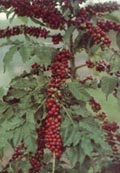 Fazenda Jacaranda sells its coffee to Japan, for a price high enough to stay in business, to maintain its devotion to sustainable agriculture and bio-diversity, and to pay its full time workers a living wage. Their Japanese distributors have visited the farm several times and can vouch first hand for its model environmental and labor practices. They are part of a 'solidarity market' where buyers and sellers build long time relationships by helping one another. Other coffee growers are not so lucky.
Fazenda Jacaranda sells its coffee to Japan, for a price high enough to stay in business, to maintain its devotion to sustainable agriculture and bio-diversity, and to pay its full time workers a living wage. Their Japanese distributors have visited the farm several times and can vouch first hand for its model environmental and labor practices. They are part of a 'solidarity market' where buyers and sellers build long time relationships by helping one another. Other coffee growers are not so lucky.
 Coffee is the 2nd most valuable commodity in international trade, behind oil. And critics of environmentally destructive agriculture have targeted the specialty coffee market to send a message about ecology and social justice in a time of globalization. After protests at Starbuck stores during its shareholder convention, the coffee giant now sells some 'fair-traded' coffee, as do Equal Exchange and other smaller distributors. Many coffee companies offer organic blends and shade grown varieties that help maintain habitat for songbirds.
Coffee is the 2nd most valuable commodity in international trade, behind oil. And critics of environmentally destructive agriculture have targeted the specialty coffee market to send a message about ecology and social justice in a time of globalization. After protests at Starbuck stores during its shareholder convention, the coffee giant now sells some 'fair-traded' coffee, as do Equal Exchange and other smaller distributors. Many coffee companies offer organic blends and shade grown varieties that help maintain habitat for songbirds.